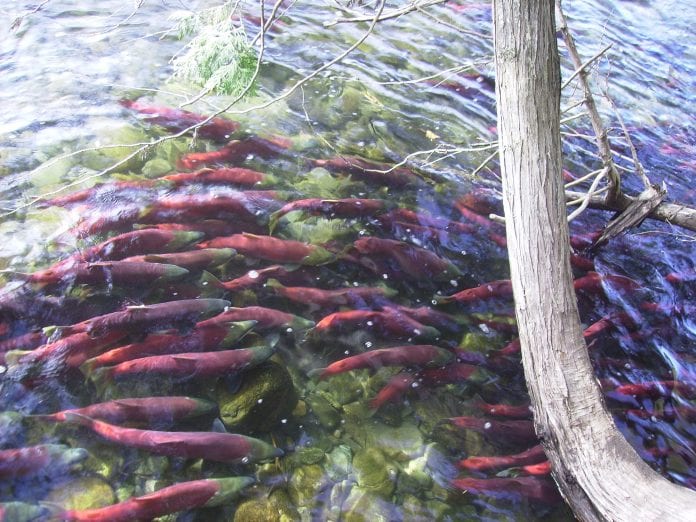Three marine conservation entities in British Columbia say they are questioning the integrity of a report issued by the Canadian government that concluded there are minimal risks to wild Fraser River sockeye salmon populations of the transfer of a specific virus from Atlantic salmon farms.
According to the report issued in late December by Fisheries and Oceans Canada in Ottawa current fish health management practices, including vaccination and eradication of infected fish help to minimize the risk.
The DFO report on Infectious Hemotopoietic Necrosis Virus, or IHNV, was presented as the first in a series that will assess the risk of pathogen transfer associated with aquaculture activities to wild fish and the environment in British Columbia’s Discovery Islands. The federal report noted that IHNV is native to the Pacific Ocean environment and while it occurs in wild salmon, farmed Atlantic salmon are more susceptible to the disease.
DFO officials said the viral management practices in question are detailed in an industry agreement, are treated by industry as a business confidence and that government staff are prohibited from releasing them under the government’s Access to Information Act.
Then on Jan. 8, the three environmental entities challenged the report, alleging that it is partially based on a secret memorandum of understanding between several salmon farming companies.
The secret memorandum that allegedly substantiates the report’s conclusions was not accessible for examination by some members of the federal science review process, said Stan Proboszcz, of Watershed Watch Salmon Society, which along with Living Oceans Society and the Pacific Coast Wild Salmon Society, are questioning the validity of the report.
Proboszcz was one of 39 experts of various disciplines selected for the peer review group based on their expertise and knowledge.
“It appears our federal government is more interested in protecting salmon farming industry secrets than maintaining scientific integrity and taking precautionary action to protect wild fish,” Proboszcz said.
The inability to examine the details of the memorandum is contradictory to the fundamental principles of peer-reviewed science, the environmental groups said. And the lack of transparency raises questions about DFO’s relationship with the salmon farming industry and potential conflict of interest between promoting the industry and protecting wild salmon stocks from industry diseases, they said.
A research paper on the effect of exposure to farmed salmon on piscine orthoreovirus infection and fitness of wild Pacific salmon in British Columbia published in December online in PLOS, the Public Library of Science, makes a connection between another marine virus, farmed and wild salmon. Scientists collaborating in the study said the disease Heart and Skeletal Muscle Inflammation, or HSMI, is causing substantial economic losses to the Norwegian salmon farming industry where the causative agent, piscine orthoreovirus, is reportedly spreading from farmed to wild Atlantic salmon with as yet undetermined impacts.
Authors of the study said their results suggest that Piscine orthoreovirus transfer is occurring from farmed Atlantic salmon to wild Pacific salmon, that infection in farmed salmon may be influencing infection rates in wild salmon and that this may pose a risk of reduced fitness in wild salmon impacting their survival and reproduction.















